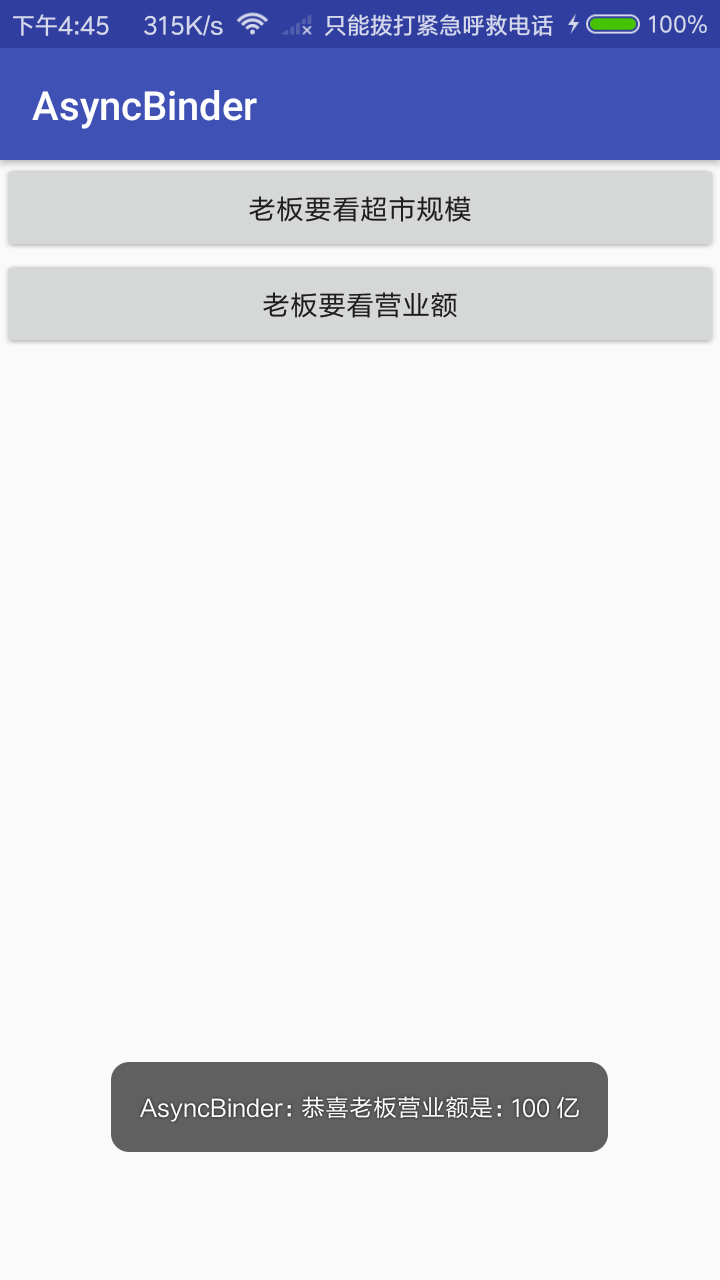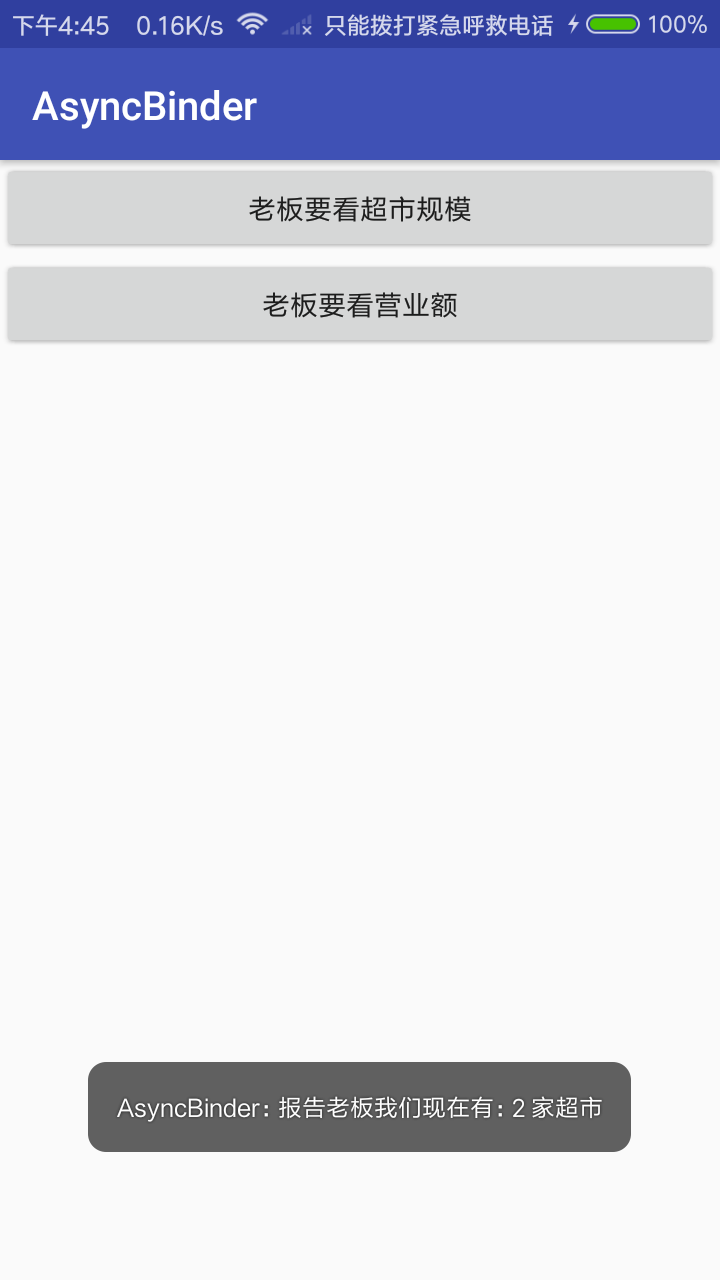利用ContentProvider实现同步Binder
在Android中跨进程通信的方式有好多种,比如 #
- Intent
- Messenger
- AIDL(Android 接口定义语言)
- ContentProvider
- Socket
以AIDL为例,在使用AIDL实现安卓跨进程通信的时候,通常分为3步: #
-
定义AIDL接口文件,在
Service的onBind方法中返回binder给客户端 -
客户端与服务端绑定,在回调函数
onServiceConnected中获取binder -
通过
Stub的asInterface方法转换为我们定义的接口,然后调用服务端逻辑。
这是一种典型的CS(客户端-服务端)架构。下面我们就用AIDL来实现跨进程通信,首先我们来定义一个问题:
假如小王是一家连锁超市的老板,他最关心的是自己的超市目前的规模以及自己超市的营业额的情况。他是需要服务的一端,所以把小王定义为客户端。针对老板的需求,我们需要提供两个服务,一是查询连锁超市的数量而是查询超市的营业额。
既然需求有了,现在我们就来实现它:
客户端就定义一个BossActivity用于显示连锁超市目前的规模以及营业额。
服务端为了解耦就定义两个Service,OrderService(查询营业额)和StoreService(查询超市规模)
接下来按照上面的三步走,我们依次来实现一下
1. 定义AIDL #
- 定义
IOrderService.aidl包括查询营业额的服务
package qiwoo.android.sync.binder;
interface IOrderService {
// 获取营业额
int getOrderAmount();
}
- 定义
IStoreService.aidl包括查询超市规模的的服务,其实就是store的数量
package qiwoo.android.sync.binder;
import qiwoo.android.sync.binder.Store;
interface IStoreService {
// 获取超市的列表
List<Store> getStores();
}
2. 在Service中实现接口并作为binder返回 #
OrderService具体实现如下
public class OrderService extends Service {
@Override
public void onCreate() {
super.onCreate();
}
IOrderService.Stub mOrderService = new IOrderService.Stub() {
@Override
public int getOrderAmount() throws RemoteException {
// 方便演示这里就不涉及过多逻辑,简单返回数据
return 100;
}
};
@Nullable
@Override
public IBinder onBind(Intent intent) {
//返回 OrderService binder
return mOrderService;
}
}
StoreService具体实现如下
public class StoreService extends Service {
private List<Store> stores;
@Override
public void onCreate() {
super.onCreate();
// 方便演示这里就不涉及过多逻辑,简单创建数据
Store store1 = new Store(1, "qiwoo", "123", "beijing");
Store store2 = new Store(2, "mobile", "123", "beijing");
stores = new ArrayList<>();
stores.add(store1);
stores.add(store2);
}
IStoreService.Stub mStoreService = new IStoreService.Stub() {
@Override
public List<Store> getStores() throws RemoteException {
return stores;
}
};
@Nullable
@Override
public IBinder onBind(Intent intent) {
// 返回 StoreService binder
return mStoreService;
}
}
3. 在BossActivity中 bindService
#
- 绑定服务
Intent orderIntent = new Intent();
orderIntent.setClass(this, OrderService.class);
bindService(orderIntent, mOrderServiceConnection, Context.BIND_AUTO_CREATE);
Intent storeIntent = new Intent();
storeIntent.setClass(this, StoreService.class);
bindService(storeIntent, mStoreServiceConnection, Context.BIND_AUTO_CREATE);
- 传入的ServiceConnection
private ServiceConnection mOrderServiceConnection = new ServiceConnection() {
@Override
public void onServiceConnected(ComponentName name, IBinder service) {
// 在这里,绑定成功之后,我们就拿到了binder
mOrderService = IOrderService.Stub.asInterface(service);
}
@Override
public void onServiceDisconnected(ComponentName name) {
}
};
- 调用远程服务
try {
// 在 onServiceConnected 中拿到的binder
int amount = mOrderService.getOrderAmount();
Toast.makeText(BossActivity.this, "恭喜老板营业额是:" + amount + " 亿", Toast.LENGTH_SHORT).show();
} catch (RemoteException e) {
e.printStackTrace();
}
到目前为止,一切都很顺利。我们通过AIDL实现了跨进程通信,来测试一下结果和我们预期的也一样。


非常棒,老板很有钱,晚上又可以给我们加鸡腿了。但是有没有发现一个问题:在BossActivity中想要调用另一个进程的服务,必须要等 bindService中传入的ServiceConnection拿到onServiceConnected的回调才能使用,也就是我们异步的获取了binder。有的时候我们并不想这样做,有没有一个办法可以直接通过一个get方法就拿到binder呢?
答案当然是肯定的啦,现在我们再回到文章开头看看实现跨进程通信中常见的几种方式,有一个ContentProvider接下来它就是我们的主角了,对ContentProvider不熟的同学可以去查一下它的用法。我们就通过它来实现在客户端同步获取binder,怎么去做呢,同样三步走。
-
定义AIDL接口文件和实现类
-
定义一个
ContentProvider根据查询参数的不同返回具体的服务binder -
查询
ContentProvider获得Cursor然后通过Stub的asInterface方法转换为我们定义的接口,然后调用服务端逻辑。
1. 定义AIDL和实现类 #
AIDL和上面完全一样,不再重复
OrderServiceImpl实现
public class OrderServiceImpl extends IOrderService.Stub {
@Override
public int getOrderAmount() throws RemoteException {
return 100;
}
}
StoreServiceImpl实现
public class StoreServiceImpl extends IStoreService.Stub {
private List<Store> stores;
public StoreServiceImpl() {
Store store1 = new Store(1, "qiwoo", "123", "beijing");
Store store2 = new Store(2, "mobile", "123", "beijing");
stores = new ArrayList<>();
stores.add(store1);
stores.add(store2);
}
@Override
public List<Store> getStores() throws RemoteException {
return stores;
}
}
2. 定义BinderProvider主要代码如下:
#
public Cursor query(@NonNull Uri uri, @Nullable String[] projection, @Nullable String selection, @Nullable String[] selectionArgs, @Nullable String sortOrder) {
IBinder binder;
if (selectionArgs[0].equals(SERVICE_ORDER)) {
binder = new OrderServiceImpl();
Log.d(TAG, "Query OrderServiceImpl");
} else if (selectionArgs[0].equals(SERVICE_STORE)) {
binder = new StoreServiceImpl();
Log.d(TAG, "Query StoreServiceImpl");
} else {
return null;
}
BinderCursor cursor = new BinderCursor(new String[]{"service"}, binder);
return cursor;
}
ContentProvider的query方法返回的是一个Cursor,现在的场景不像查询数据库一样可以通过SQLiteDatabase的query方法直接返回一个Cursor,而Cursor又是一个接口,没有办法直接实例化。所以我们需要找一个可以实例化一个Cursor,这里用到了MatrixCursor。有了Cursor之后就可以把根据查询参数的不同我们返回了不同的binder放到Cursor中返回。下面我们来看一下BinderCursor
public class BinderCursor extends MatrixCursor {
static final String KEY_BINDER = "binder";
Bundle mBinderExtra = new Bundle();
public static class BinderParcelable implements Parcelable {
public IBinder mBinder;
public static final Creator<BinderParcelable> CREATOR = new Creator<BinderParcelable>() {
@Override
public BinderParcelable createFromParcel(Parcel source) {
return new BinderParcelable(source);
}
@Override
public BinderParcelable[] newArray(int size) {
return new BinderParcelable[size];
}
};
BinderParcelable(IBinder binder) {
mBinder = binder;
}
BinderParcelable(Parcel source) {
mBinder = source.readStrongBinder();
}
@Override
public int describeContents() {
return 0;
}
@Override
public void writeToParcel(Parcel dest, int flags) {
dest.writeStrongBinder(mBinder);
}
}
public BinderCursor(String[] columnNames, IBinder binder) {
super(columnNames);
if (binder != null) {
Parcelable value = new BinderParcelable(binder);
mBinderExtra.putParcelable(KEY_BINDER, value);
}
}
@Override
public Bundle getExtras() {
return mBinderExtra;
}
}
可以看到它继承自MatrixCursor,然后通过Bundle包装了binder,这样就可以 new 一个 MatrixCursor 的对象返回了。
3. 查询ContentProvider获得cursor调用服务端逻辑。
#
final ContentResolver resolver = MainActivity.this.getContentResolver();
final Cursor cu = resolver.query(CONTENT_URI, null, null, new String[]{SERVICE_ORDER}, null);
if (cu == null) {
return;
}
IBinder binder = getBinder(cu);
try {
IOrderService orderService = IOrderService.Stub.asInterface(binder);
int amount = orderService.getOrderAmount();
Toast.makeText(MainActivity.this, "恭喜老板营业额是:" + amount + " 亿", Toast.LENGTH_SHORT).show();
} catch (RemoteException e) {
e.printStackTrace();
}
cu.close();
这里,我们为了获得营业额和超市规模的数据传入的查询参数是SERVICE_ORDER 和SERVICE_STORE,假如有很多个服务就可以把这部分代码再进行封装,写一个管理类,根据不同的参数返回不同的service。
这样我们获取binder就是同步的了,不需要再等待回调,query出来直接使用。打印的结果和上面是一样的,不再展示。